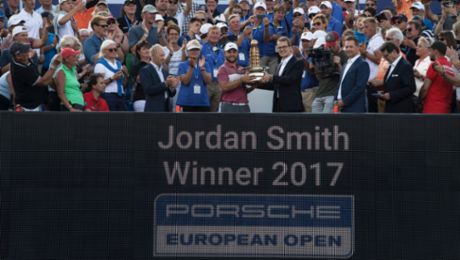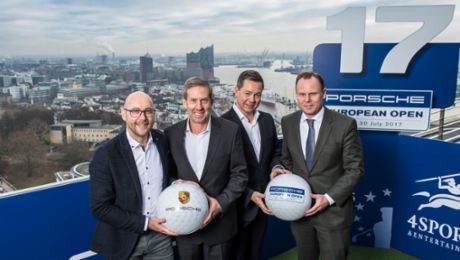Day 4
The 39-year old only qualified for the tournament with a win the week before on the second tier Challenge Tour. It was his first ever win on the European Tour at his 285th attempt. With a total of 277 (11 under par), he finished ahead of the German amateur Allen John, the Swede Christofer Blomstrand and the Italian Renato Paratore all in joint second one stroke behind. On the final day, 14,300 spectators (total attendance: 39,000) once again lined the fairways. They saw one top star after the other fall by the wayside: Paul Casey (-8, England) was joint seventh, South African Charl Schwartzel (-7) finished joint ninth with Masters Champion Patrick Reed (USA). After starting the final day at the top of the leaderboard, Bryson DeChambeau (USA) posted a six over par round to leave him visibly disappointed in joint 13th.
“We have seen some fascinating golf in a fantastic setting. The Porsche European Open is now well-established. It offers an attractive package with top golf and an intensive brand experience, something that has been confirmed by the highly positive feedback from our customers. It means we’re already looking forward to the tournament in 2019,” said Andreas Haffner, Member of the Porsche AG Executive Board, who presented the winner’s trophy to Richard McEvoy.
Tournament director Dominik Senn confirmed that the 2019 Porsche European Open will be played from 5 to 8 September. The event will thus benefit from the changed European Tour and US PGA Tour schedules. As in future the FedExCup will be played in August, the new date offers better opportunities to invite top players. Senn: “Notwithstanding, we’ll continue with our concept of offering high-class golf with a mixture of top players from both sides of the Atlantic, plus young up-and-coming golfers.”
The European Open in its 40th year
The European Open produced scores of stories in its 40th year – like for instance the impressive performance of the young Austrian pro Matthias Schwab over the first three rounds. It gave him the opportunity to play over the weekend alongside the Masters winner Patrick Reed and therefore in front of a big crowds. Or local hero Benedict Staben’s outstanding start when he shot a 67 to place him in the Top 10. All-in-all, the German players put on a good show over the four days – seven made the cut, more than ever before.
The best story was however written by the amateur Allen John from Ludwigshafen am Rhein. The 30-year old, who plays for the St. Leon-Rot Golf Club’s men’s team in the top German league competition, last year won the gold medal in golf at the Deaflympics in Samsun, Turkey. And now he has shown that he can compete with the European Tour’s elite in his foray onto the top European professional circuit. The former Ryder Cup winner Peter Hanson (Sweden) was particularly impressed by the huge length of the German’s drives: “It’s something I’ve never seen before in professional golf, and I’ve seen them all. Allen simply takes out various obstacles that are alone an optical challenge for every other pro.”
Day 3
He is the surprise package of the first three days of the Porsche European Open: Matthias Schwab, the 23-year old professional golfer from Schladming at the foot of the Dachstein mountain range in Austria – a town best known all over the world as a winter sports resort. In the penultimate twosome, the Austrian accompanied Masters champion Patrick Reed (USA) around the Porsche North Course and was completely unperturbed by the situation. At times Schwab even headed the leaderboard, which Bryson DeChambeau (-12, USA) and Richard McEvoy (England) jointly lead before the final round on first place. Matthias Schwab (-11) and Patrick Reed (USA) are in the third place, followed by Paul Casey (-9, England) in the 5th place.
Matthias Schwab has been a pro now for a year
After the tropical temperatures on the previous days, a violent thunderstorm during play on the third afternoon caused a three-hour break at the Green Eagles Golf Courses. Matthias Schwab also took everything – like the 7,900 crowd – in his stride. On the homepage of his main sponsor, he is quoted as saying, “I play with confidence, believe in myself and keep a cool head.”
And there really was no reason for him to freeze in for instance the company of the US PGA Tour stars. As a student at the prestigious American Vanderbilt University in Nashville, Tennessee – it voted him the Athlete of the Year in 2016 – he gained the necessary competitive toughness in college golf which included direct duels with a certain Bryson DeChambeau. He has also minutely planned his career on the professional tour. It started when he competed as a 15-year old amateur at the Lyoness Open where he finished in a sensational 32ndplace.
He has been a pro now for a year. This is all the more impressive due to the fact that he was out injured for 11 months in 2014 with a back problem. “In this time, I not only doubted that I’d ever make it on the pro tour but also whether I would even ever be able to play golf normally again,” remembers Matthias Schwab. “The bottom line is that the phase actually helped me to be even more thankful for what I can do.”
Legendary coach Willi Hoffmann supports Schwab – a good omen for the future
The Austrian’s main pillars include his father, a former Olympic bobsledder, and his brother. No less important is his legendary coach Willi Hoffmann, who more than three decades ago guided Germany’s best ever golfer Bernhard Langerto the top of the golfing tree and who still coaches the serial winner on the PGA Tour Champions right up to the present day. Definitely a good omen for the future of the extremely single-minded and highly-talented young professional from the winter sport resort.
Day 2
The composition of the threesomes was definitely not a coincidence: Alexander Levy (France), winner of the 2016 Porsche European Open and last year’s runner-up, played the first two rounds of the 2018 European Open on the Porsche North Course with Thomas Björn. The 48-year old Dane is the captain of this year’s European Ryder Cup team that will play USA on the outskirts of Paris from 28 to 30 September 2018. For him, it is an important part of his job to once again personally take a look at one of the hottest wild card candidates. In posting a round of 68, Levy was four under par for today, Friday. Now seven under for the tournament, he put himself in a good position for the weekend in front of 7.500 spectators at Green Eagle Golf Courses. Bryson DeChambeau (-10, USA) continues to lead the leaderboard peppered with top stars, ahead of surprisingly strong Matthias Schwab (Austria) and Richard Mcevoy (both -9, England) and Masters Champion Patrick Reed (-8, USA). Philip Mejow (-6) from Berlin is the best German with Paul Casey (England) in 9th place.
Thomas Björn: “They can all play golf"
A possible wild card for Alexander Levy has been a talking point for weeks. And naturally there is nothing French golf fans would love more as the – after the Olympic Games and football World Cup – third biggest sports event which will take place for the first time ever in France. However, was not to be drawn on the subject at the Porsche European Open. He was visibly impressed “especially by the back nine holes and Alexander’s finish with four birdies that show just what he is capable of when he’s on fire.” But there is the other side of the very emotional Frenchman when things are not going his way.
“They can all play golf,” knows Björn, “but I have to get an idea of how the players function in certain situations and in the end choose those that gel together to make up the best team.” Whilst Alexander Levy’s participation is therefore still open, as far as Martin Kaymer (Germany) is concerned, Björn excludes even theoretical chances of a wild card. Björn: “I know him very well and he is without doubt one of the world’s best pros and would be an excellent addition to every team. At the moment however, things are not going well as he, as far as I can see, is caught up between the European Tour and the PGA Tour, and can’t decide. But he’s smart enough to sort it out in the future.”
Thomas Björn, himself a three-time Ryder Cup winner, will by the way only be a spectator over the weekend at the Porsche European Open. He missed the cut by some way. No wonder as Björn has basically spent the past months travelling around the world watching possible team members. There wasn't much room for his own golf, "but I definitely have bigger themes to deal with at the moment".
Leaders’ car for the Top-placed
"It's always great fun when we can do something unusual and out of turn. Especially in this inspiring city." US top star Bryson DeChambeau made a statement immediately after the Porsche Urban Golf Challenge at Spielbudenplatz in the heart of St. Pauli. It is also unusual that the leader of the Leaderboard can drive a Porsche 911 Carrera GTS Cabrio the next day to cover the distance from the Le Meridien Players' Hotel in Hamburg to the Green Eagle Golf Courses. And the smile on the face of the Californian shows us that the fun has not been neglected here either.
Day 1
At six under par, he quickly led the field that defied the 6,934-meter Porsche North Course belonging to the Green Eagle Golf Courses to return to the clubhouse with a string of low scores on the first day of the long-established professional tournament. Local hero Benedict Staben (Germany) in particular enjoyed a dream start after shooting a 67 around the par 72 course to finish one shot behind the leader.
Whilst the 7,100 spectators had trouble in bearing up to the heat, the Californian DeChambeau really got into the swing of things in conditions that were very familiar to him. “As far as I’m concerned, it could get a couple of degrees hotter.” The 24-year old pro from Modesto can well imagine that the unusual temperatures could give the players normally at home on the US PGA Tour a little – quite possibly a decisive – advantage. “We’re used to staying concentrated right up until the last putt in these conditions.”
Paul Casey (-3) is in shared 14th place
The threesome containing Bryson DeChambeau, Paul Casey (England) and Adrian Otaegui (Spain), which teed-off early on at 8 o’clock, were clearly at the focus of spectator interest. The physics-lover DeChambeau, who has been given the nickname “Professor Golf” due to his extremely analytical approach in everything technique, equipment and course management, has shown himself in Hamburg as everything but somebody that is guided solely by his head. Away from the course, he is very approachable for his fans and has secured the support of the knowledgeable crowd. This could also quite possibly be down to him letting on for the first time in the past few days that he has “German roots on my mother’s side”.
The other top players on the PGA Tour were initially all queuing up behind Bryson DeChambeau: Paul Casey (-3) is in shared 14th place, Masters Champion Patrick Reed (USA) and Charl Schwartzel (South Africa), both -2, are in shared 26th place. Besides Benedict Staben, amateur Allen John (Ludwigshafen/Rhine) also surprised on the shared 6th place (-4). Philipp Mejow from Berlin (-3) and Maximilian Kiefer (-3, Bergisch Gladbach) are in a good position in 14th place.
Perfect warm-up for Paul Casey
The Porsche European Open can begin right now for Paul Casey, the world class golfer from England: Before the start of the European Tour tournament that will be played on Hamburg’s doorstep around the Green Eagle Golf Course’s Porsche North Course from 26 to 29 July 2018, Casey absolved his very own warm-up programme. On the ADAC’s – the main German automobile club – driving safety centre in nearby Lüneburg, the 41-year old was able to put his driving skills to the test and live out his passion for Porsche.
“For me, it’s always safety first on the roads. It makes it all the more nicer for me to be able to take out a GT3 RS for instance on closed roads. Simply dreamlike and the perfect warm-up for the tournament week,” said the multiple winner on both the European Tour and the US PGA Tour. Driving a Porsche Cayenne, Casey also explored the off-road terrain. He duly became aware of some parallels to golf: “On-road feels like a fairway, Off-road more like the rough. To be honest, I prefer the fairway – when driving sports cars and playing golf.”
You can watch a video here.
Porsche Urban Golf Challenge
In the line-up were the top stars Patrick Reed, Pat Perez, Bryson DeChambeau (all USA), Jordan Smith (England), Charl Schwartzel (South Africa) as well as the German hope, Alexander Knappe. A course with three themes was specially built for them on the so-called “Kiez”: The “Hamburger Dom” representing the biggest festival in the north, “Street Art”, in allusion to Hamburg’s famous artistic scene and “Hamburger Hafen” (Hamburg Port). From a tee platform, the pros had to hit a variety of targets and win points. The start was marked by a tin can shooting and then they had to hit a shipping container and a boat as well as a shopping trolley and a trash can.
The most accurate in a competition the pros also found to be rather unusual was Pat Perez (USA). As a reward he can now travel around during the tournament week in his very own Porsche 911 GTS. His conclusion: "An extraordinary event for us too. The atmosphere here was simply fantastic. We had a lot of fun together. And now I'm looking forward to driving a Porsche."
You can watch a video here.
Preview
With prize money totalling two million euro, the Porsche European Open tournament belongs to the top European professional golf series and will be played on Hamburg’s doorstep around the Green Eagle Golf Club’s demanding Porsche North Course. Now in its 40th year, the European Open will be rung in tomorrow, Tuesday, with the Porsche Urban Golf Challenge. The golf show event will see the top players compete against each other on the “Spielbudenplatz” square on Hamburg’s Reeperbahn.
“40 years European Open and 70 years of Porsche sports cars: 2018 is a year full of anniversaries. This year, golf fans will once again be treated to a top line-up. We are looking forward to a very exciting high-class tournament,” said Detlev von Platen, Member of the Porsche AG Executive Board, Sales and Marketing. The PGA Tour stars will be joined by a string of top European Tour pros. First and foremost, last year’s winner Jordan Smith (England), the 2016 winner Alexander Lévy (France) and the European Ryder Cup captain Thomas Björn (Denmark). From a German point of view, there is Marcel Siem who finished quiet well at the recent Scottish Open. Countryman Marcel Schneider, who already has victory to his name in this year’s Challenge Tour, will also be competing.
Visitors will have the special opportunity to win a Cayenne Turbo
In addition to world class golf, there will again be an all-embracing Porsche brand experience both on and off the course. A ProAm tournament will be played on the first day of the event on Wednesday. Golf pros will compete alongside amateurs – including the winning pair in this year’s Porsche Generations Open series for amateurs as well as the victorious Russian team at the Porsche Golf Cup World Final.
During the tournament, not only the pros but also the visitors will have the special opportunity to win a Cayenne Turbo by hitting a hole-in-one on the 17th hole. The pre-requisite is that they hole a 30-metre putt on the Porsche Public Hole-in-One in the Public Village. They will then qualify – as long as they are over the age of 18 – for an evening shoot-out on the 17th hole on each day of the tournament.
Info
Porsche will provide the official tournament shuttle service. Additionally, Porsche Drive will offer a wide range of the latest vehicles for interested visitors to test drive. Pre-reservations can be made via the www.porsche.com/drive website. During the tournament, visitors can gain an overview of the Porsche brand world. Porsche Design, Porsche Driver’s Selection, Porsche Experience and Porsche Exclusive Manufaktur will present their range of services and products. The Porsche Owners’ Lounge on the other hand will provide customers with quite special perspectives. From the large terrace, visitors can enjoy a spectacular view of the 17th and 18th holes on the four days of the tournament. Porsche owners gain admission upon presentation of their car key.
Consumption data
911 Carrera 4 GTS: Fuel consumption combined 9.5 – 8.5 l/100 km; CO2 emissions 216 – 192 g/km
911 Carrera GTS Cabriolet: Fuel consumption combined 9.4 – 8.4 l/100 km; CO2 emissions 214 – 190 g/km
911 GT3 RS: Fuel consumption combined 12.8 l/100 km; CO2 emissions 291 g/km
Cayenne E-Hybrid: Fuel consumption combined 3.4 – 3.2 l/100 km; CO2 emissions 78 – 72 g/km; electricity consumption (combined) 20.9 – 20.6 kWh/100 km
Cayenne S: Fuel consumption combined 9.4 – 9.2 l/100 km; CO2 emissions 213 – 209 g/km
Cayenne Turbo: Fuel consumption combined 11.9 – 11.7 l/100 km; CO2 emissions 272 – 267 g/km
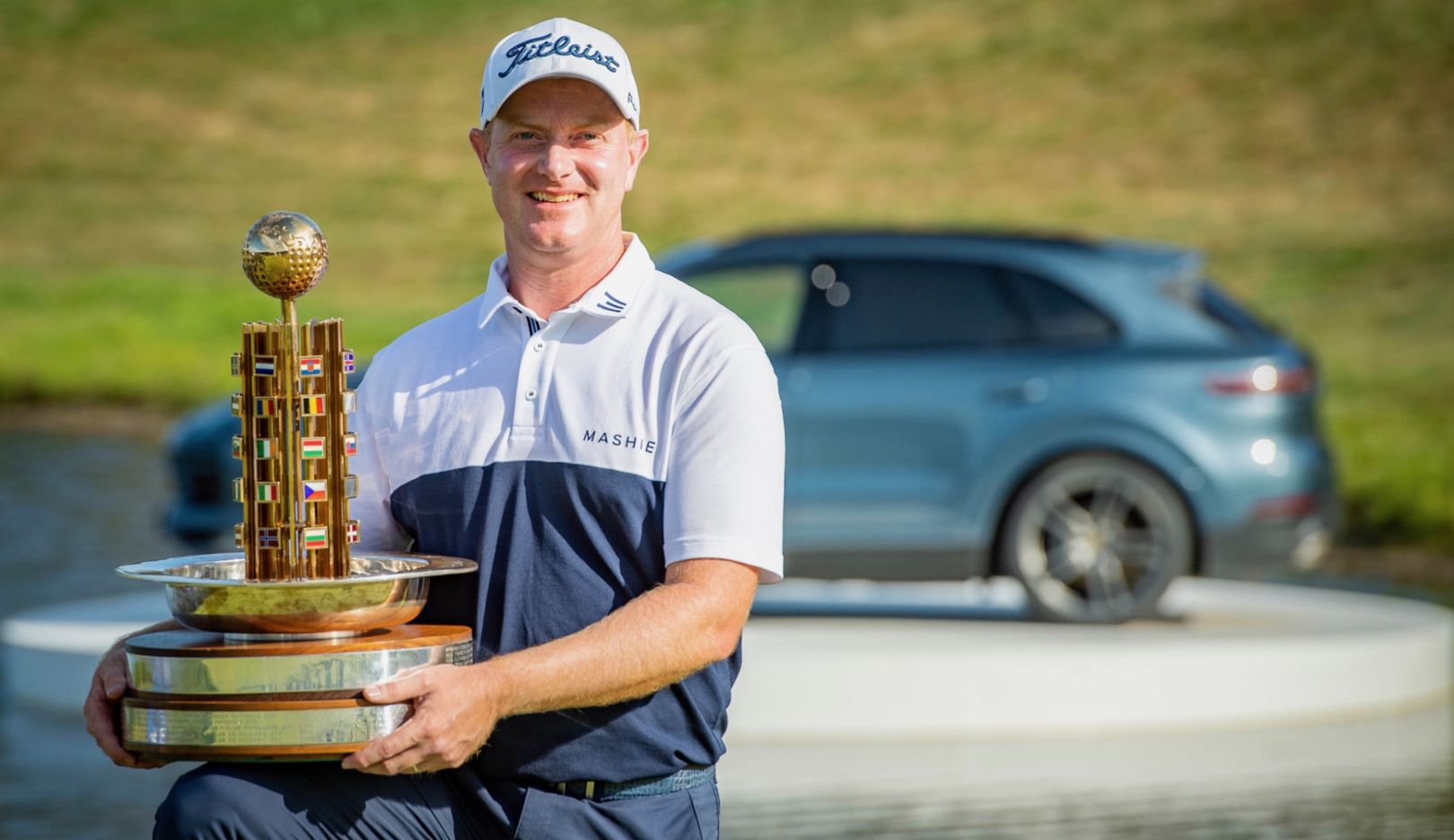
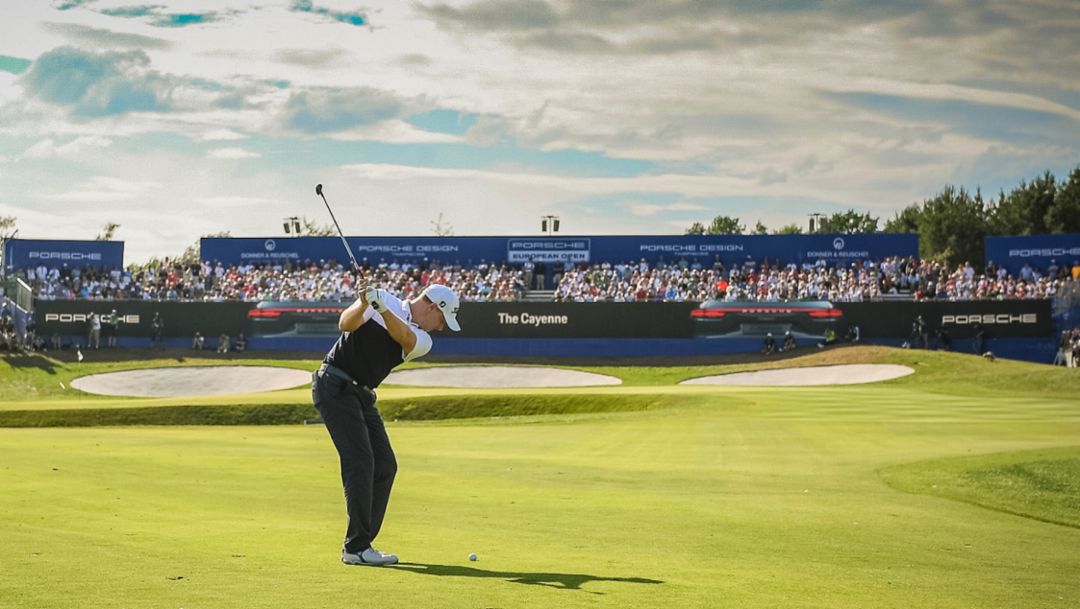
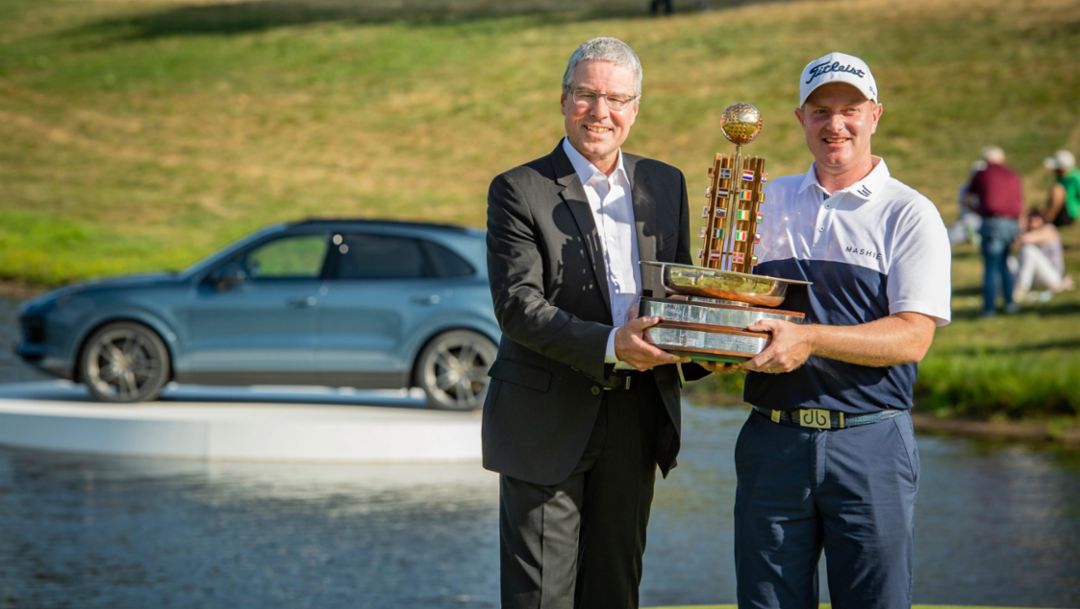
.jpg/jcr:content/Matthias%20Schwab%20(2).jpg)
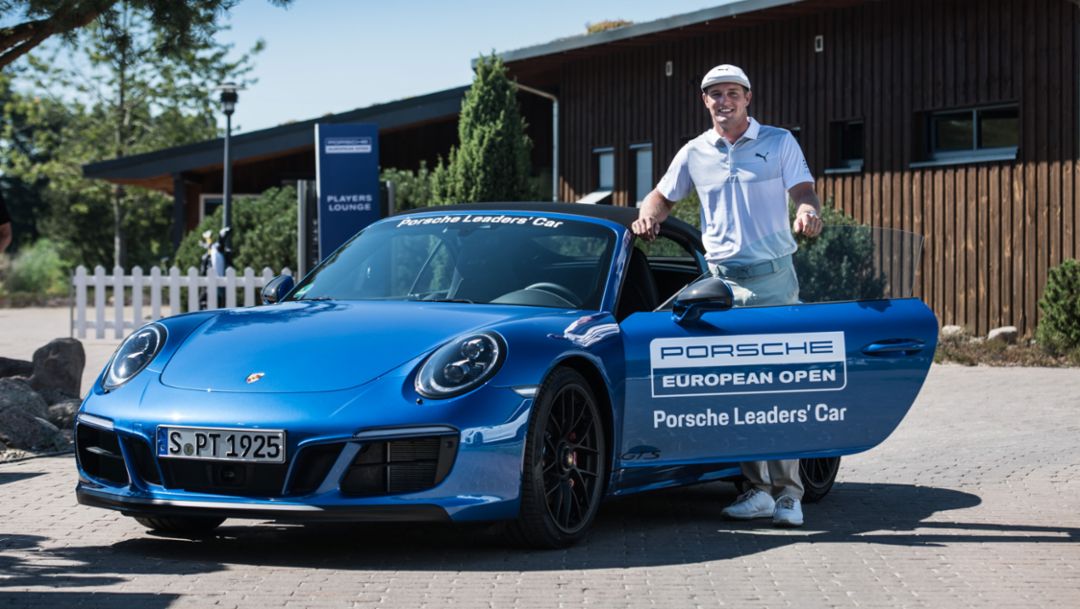

.jpg/jcr:content/b-Porsche-Experience-Cayenne-Paul-Casey-(2).jpg)
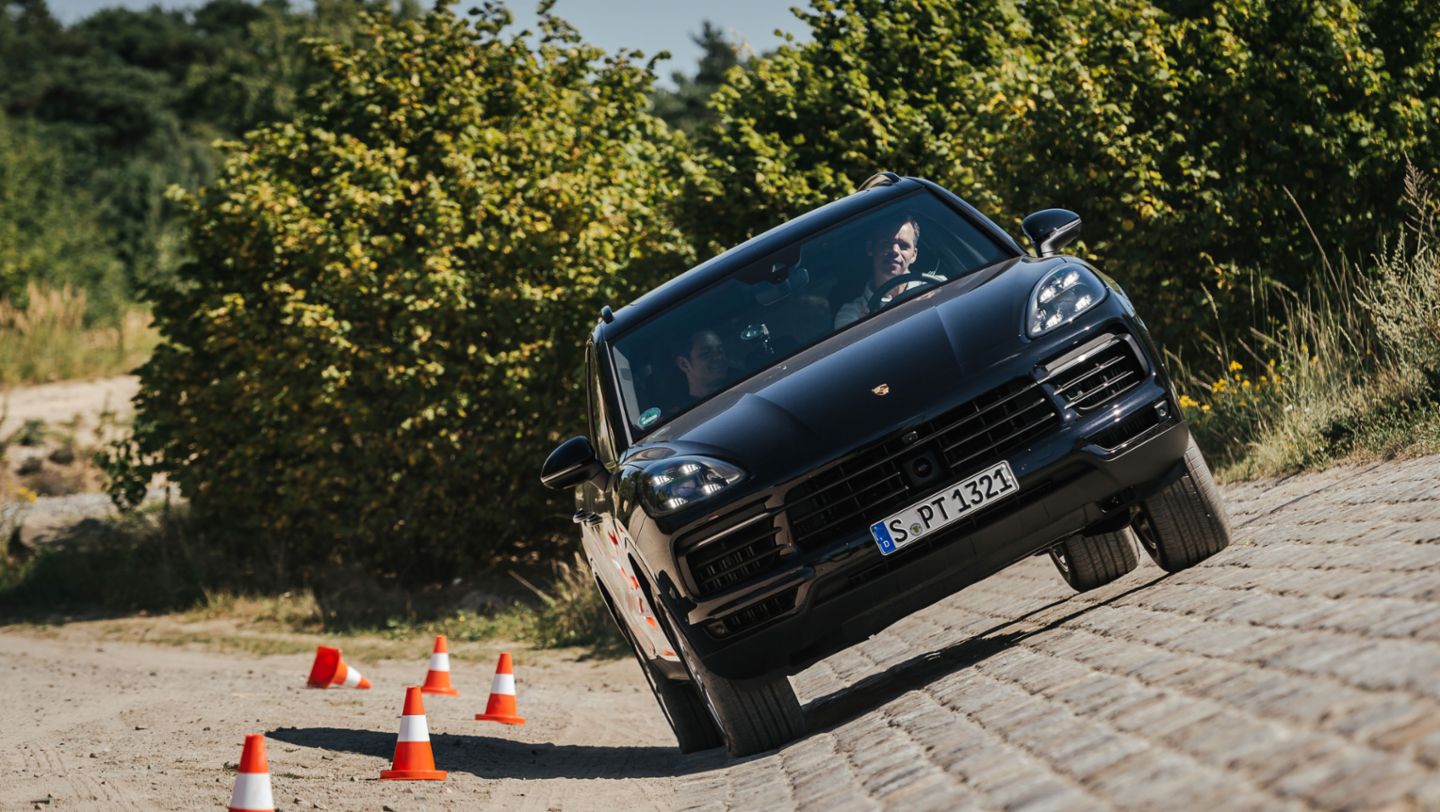
.jpg/jcr:content/b-Porsche-Experience-GT3-RS-Paul-Casey-(2).jpg)
.jpg/jcr:content/b-Porsche-Experience-GT3-RS-Paul-Casey-(3).jpg)
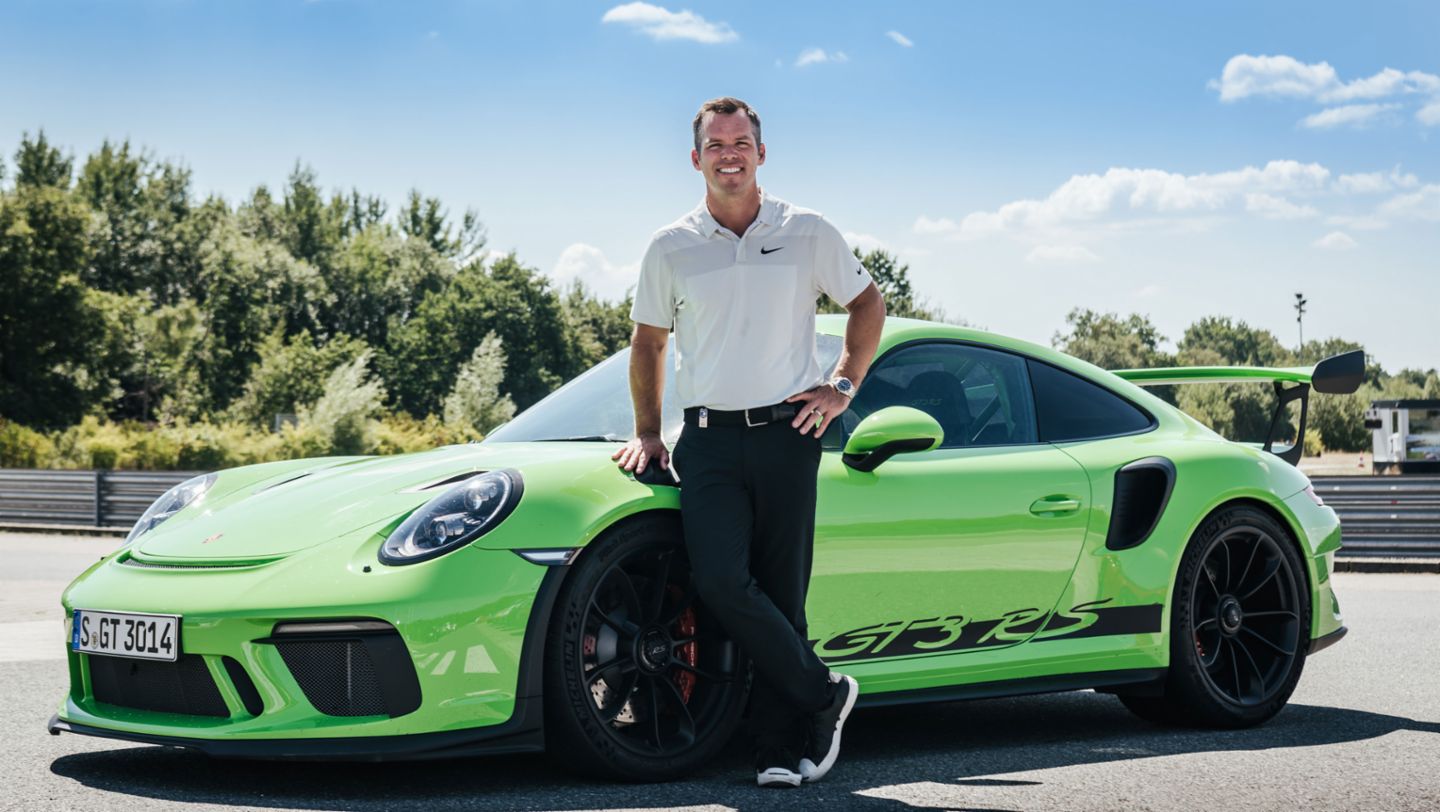
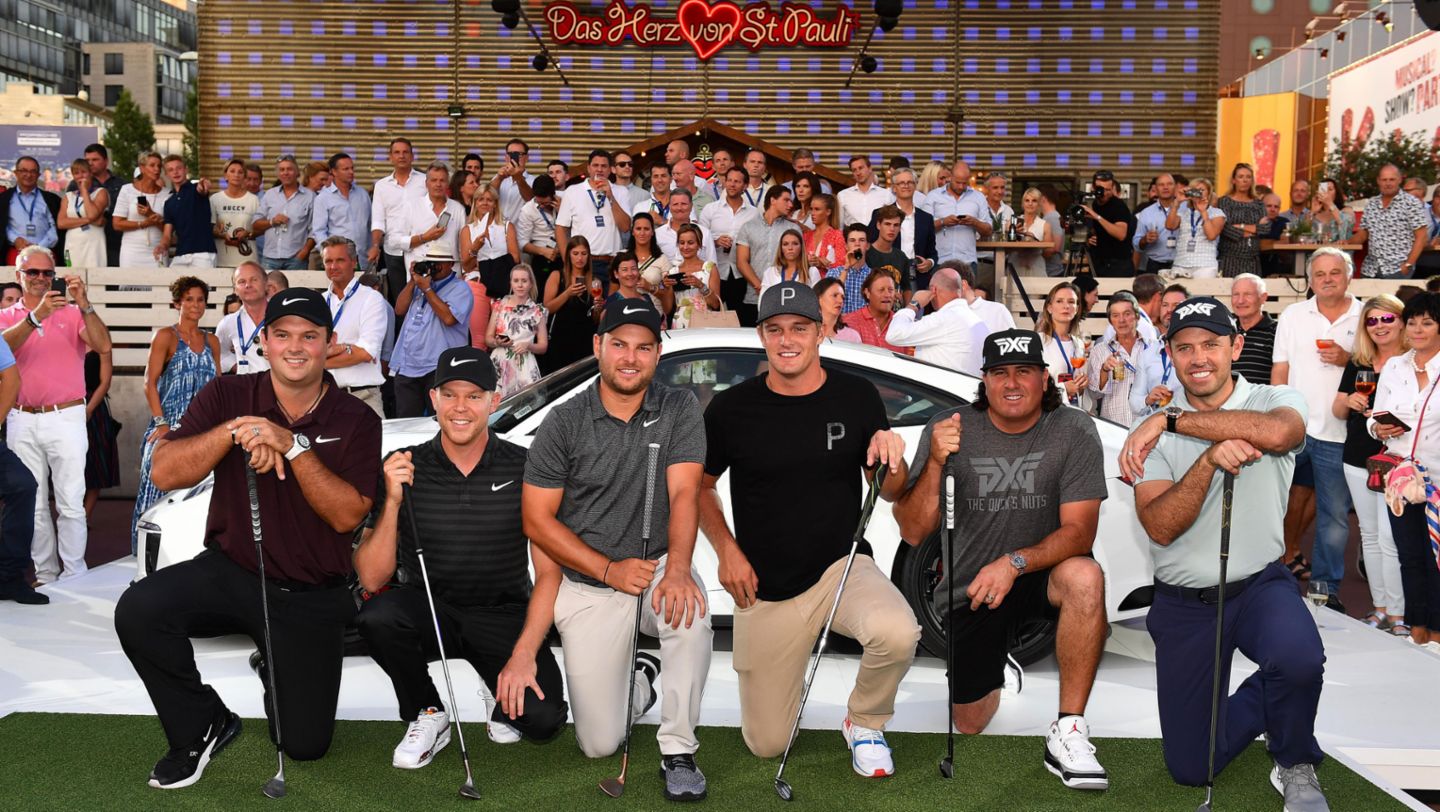
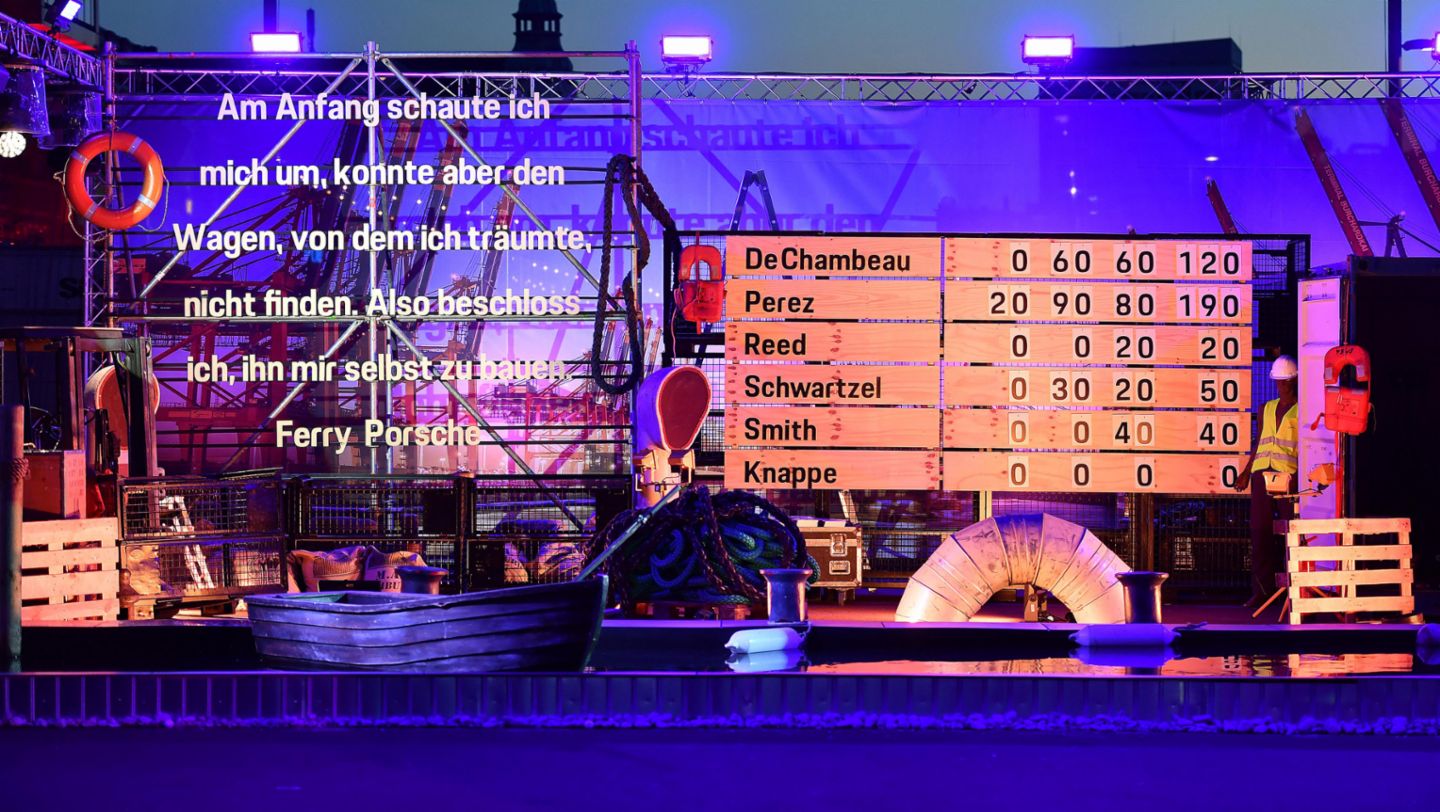
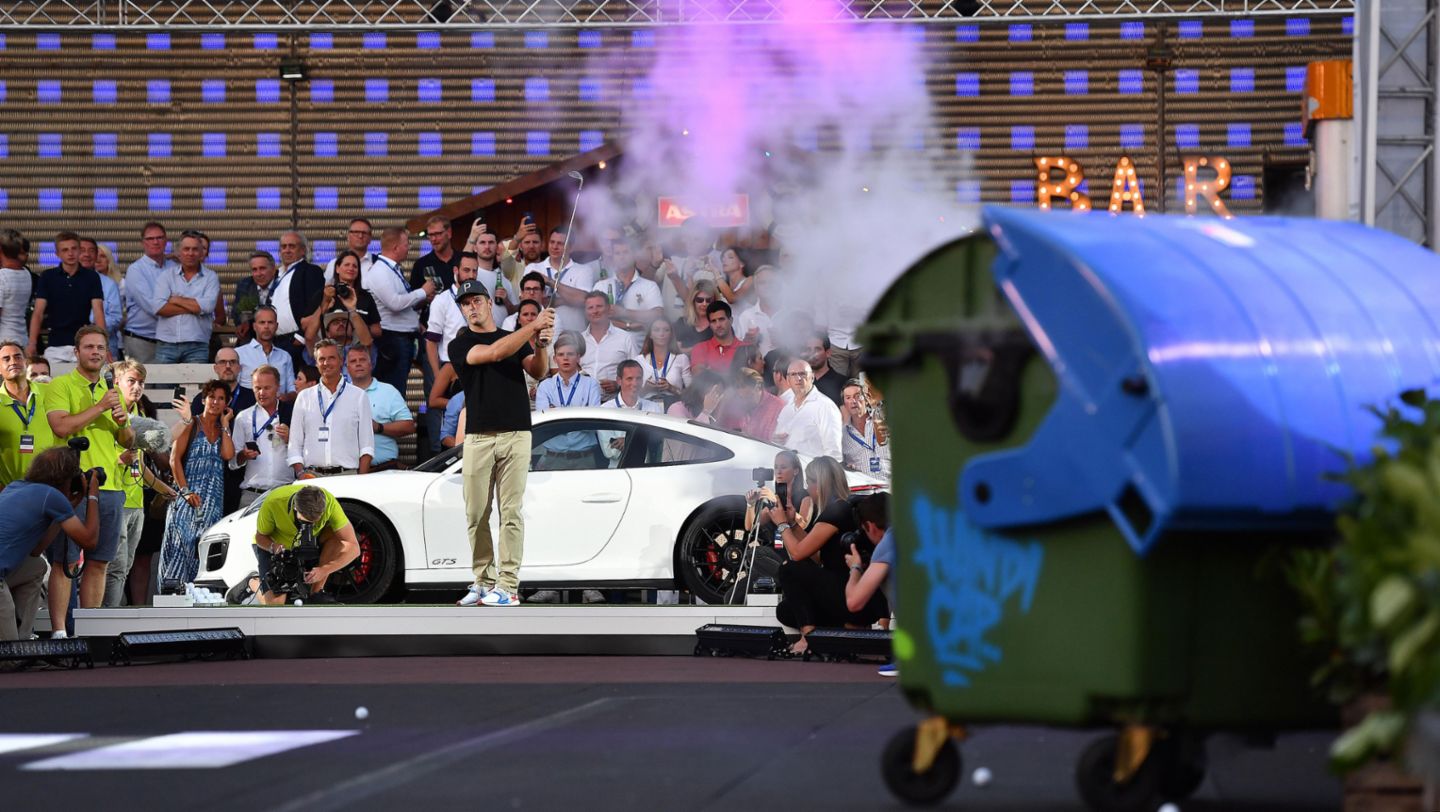
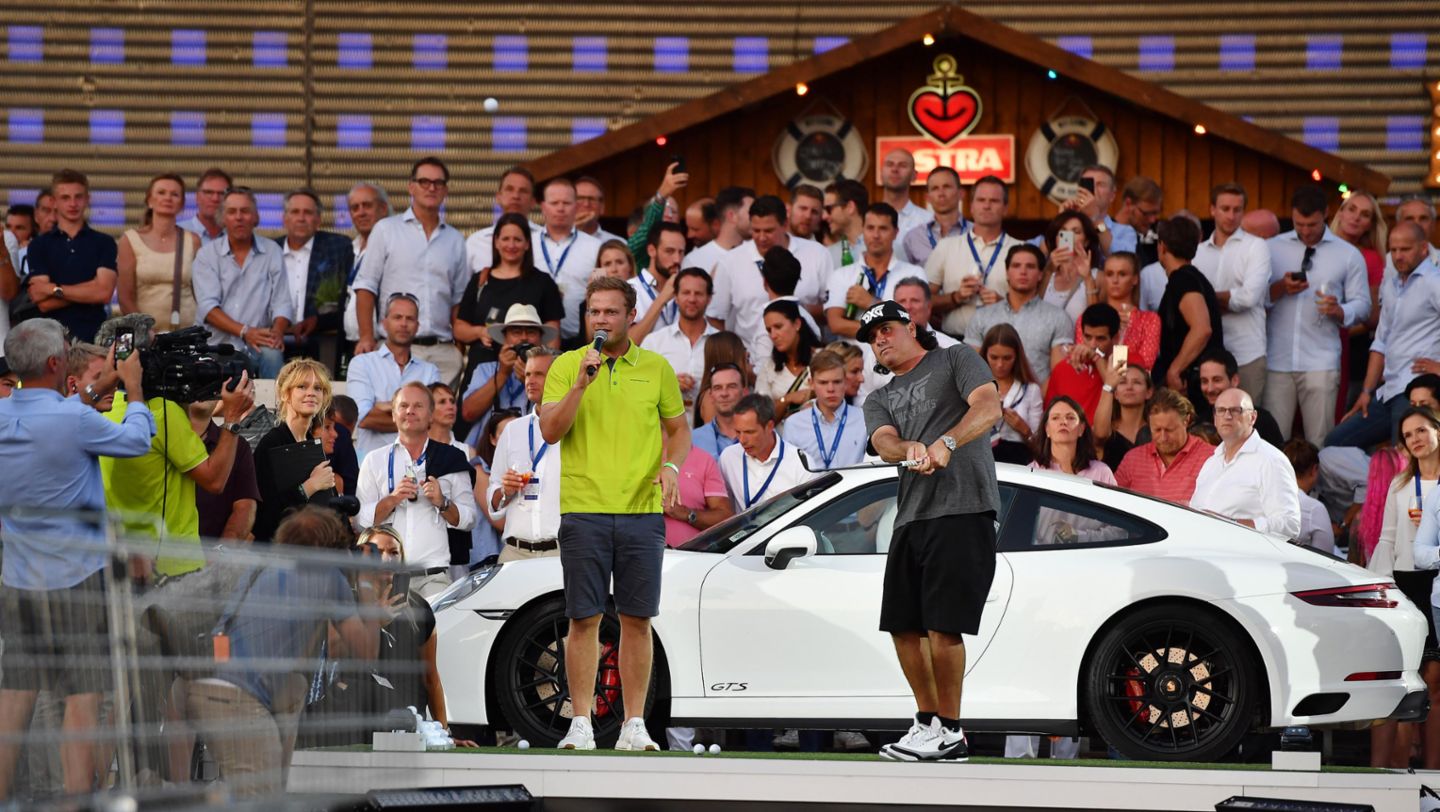
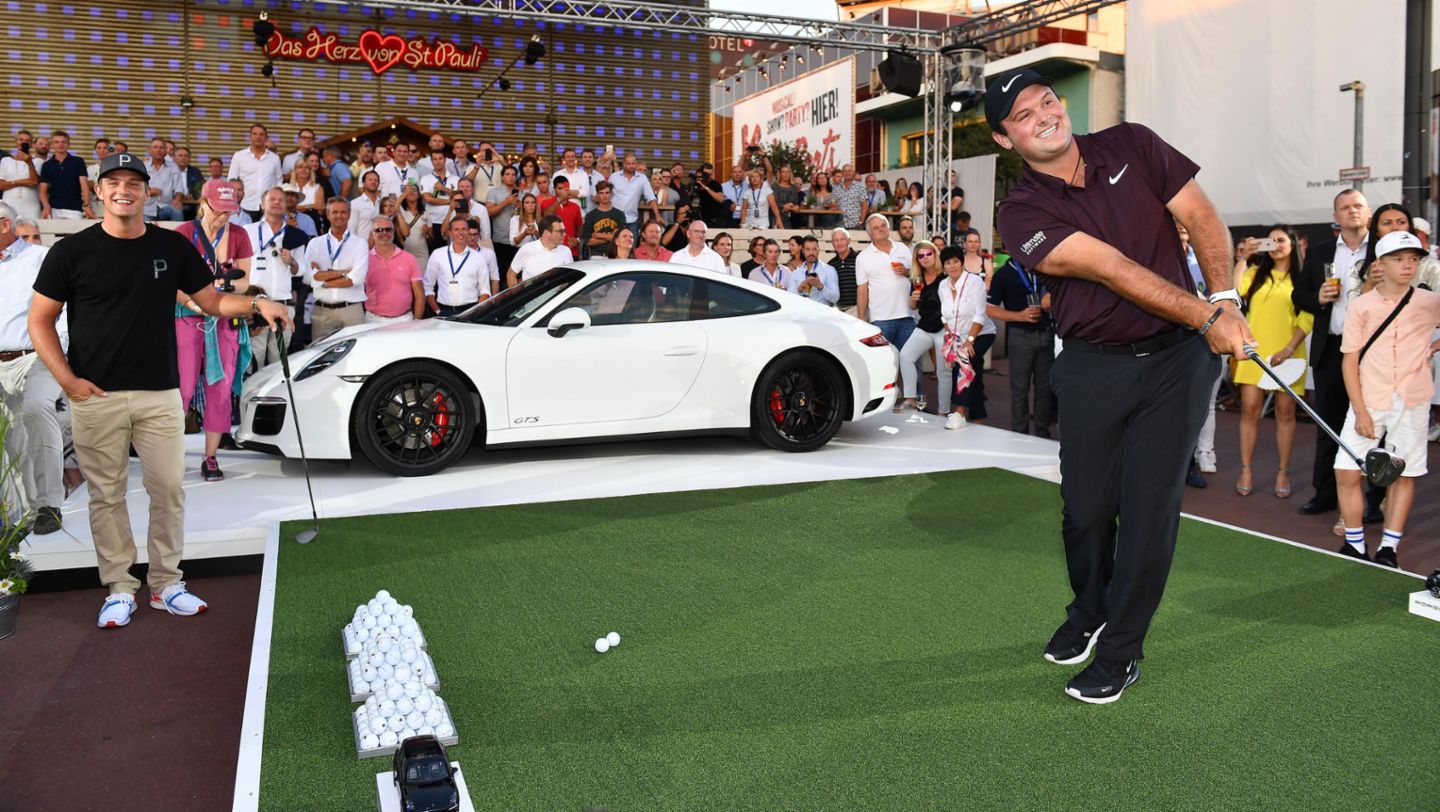
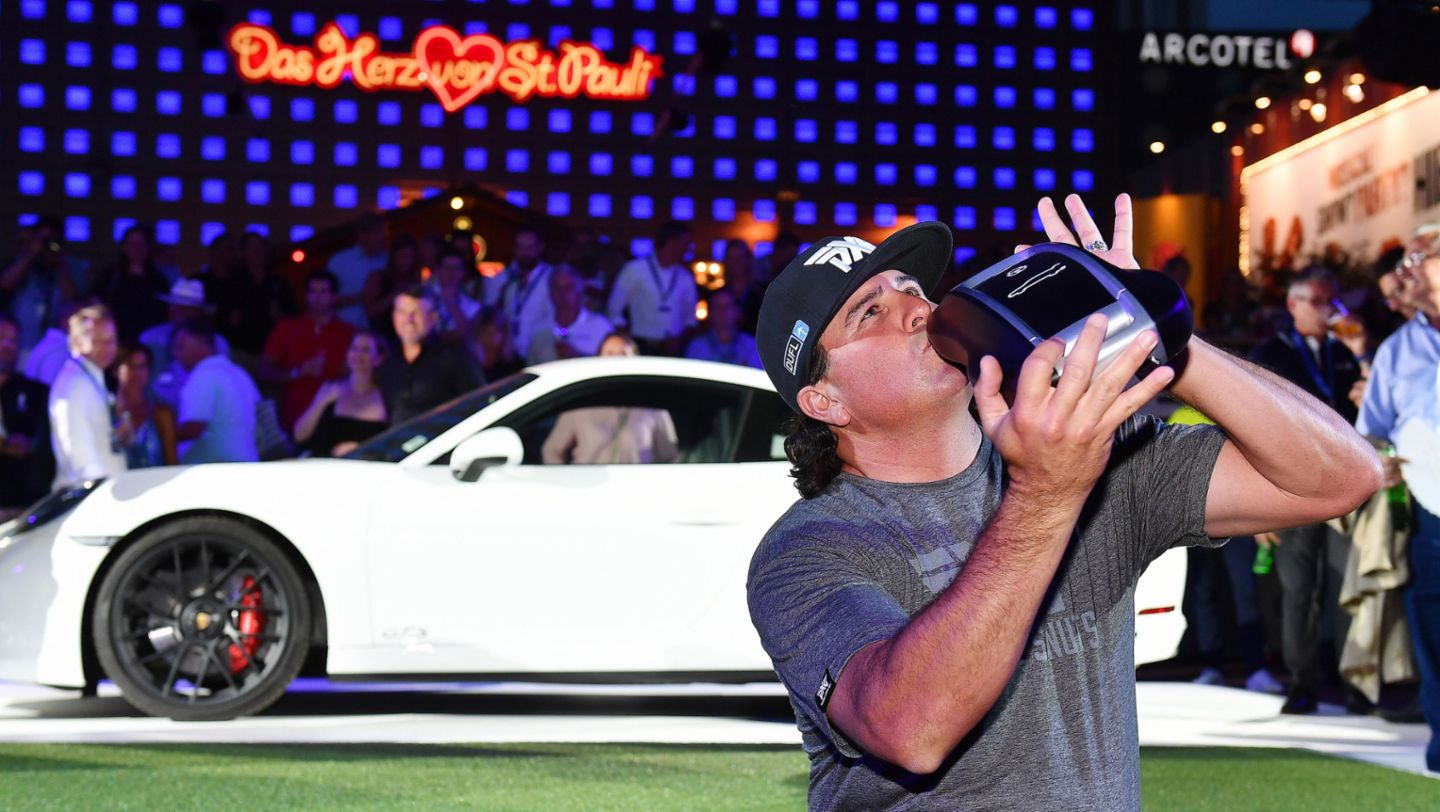
.jpg/jcr:content/b-Masters-Champion-Patrick-Reed-(USA).jpg)
